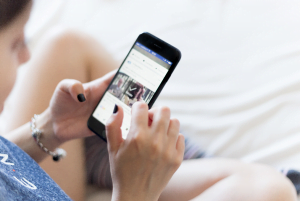 Most everybody in the modern age has a phone or access to some sort of electronic device with a screen. Technology has done wonders for society; it has saved lives, it has made everyday living more convenient and efficient, it has even connected people from all across the world who otherwise would not have had any contact. Technology is increasing at a rapid rate, and with it comes some great benefits but also some pretty significant negative effects on mental health.
Most everybody in the modern age has a phone or access to some sort of electronic device with a screen. Technology has done wonders for society; it has saved lives, it has made everyday living more convenient and efficient, it has even connected people from all across the world who otherwise would not have had any contact. Technology is increasing at a rapid rate, and with it comes some great benefits but also some pretty significant negative effects on mental health.
A 2017 study in the journal of Clinical Psychological Science looked at data from two nationally representative surveys of U.S. adolescents in grades 8 through 12 and compared that to national statistics on suicide for those ages 13 to 18 and adolescents’ depressive symptoms between 2010 and 2015, especially among females. It found that adolescents who spent more time on new media, such as social media platforms and smartphones, were more likely to report mental health issues.
Another study, which came out this year, looked at yearly surveys of eighth, 10th and 12th graders in the U.S. from 1991-2016, and measured markers of psychological well-being, such as self-esteem, life satisfaction and happiness. It found that such well-being suddenly decreased after 2012 – just at the time that smartphone and social media use peaked. There was a direct correlation between the amount of time spent on electronics and unhappiness.
There does seem to be a limit to how much screen time one can consistently take before experiencing mental health concerns. According to research, three to four hours or more a day in front of a screen is linked to unhappiness and Depression.
Putting down your phone can be really tough. The following are some tips to help you limit your screen time throughout the day:
Third-Party Apps to Limit Time on Phone
There’s an App for that. There are Apps that help you to limit the amount of time you spend on your phone by setting screen time limits. Apps such as Freedom, In Moment, Space, App Detox, and Off the Grid are all highly rated.
Use an App to Keep Track Of Your Screen Time
There’s an App for that as well! It doesn’t limit your screen time, but it does keep track of how often you’re on your phone throughout the day. Having that piece of awareness may be a key factor in how you adjust your phone usage. Apps such as Moment, Screen Time, ZenScreen, and RealizD are all great for keeping track of how much time you spend on your phone.
Put Off Buying a Child a Phone until Absolutely Necessary
The highest numbers of users of technology are children and adolescents. It may be difficulty as your child will probably be pressured by peers to obtain the latest technology, but if you can hold off their phone usage for as long as possible, research shows that this will help them to improve their social skills and will increase their general happiness.
Keep Yourself on a Schedule
Making sure that you have a set schedule, and sticking to that schedule, is essential for mental health in general, but it can also really help to alleviate the need to always be on your phone. If you have things that you’re doing, you won’t be bored and go to your phone to pass the time.
Turn Off Push Notifications
We all know the feeling of having a push notification show up on our phone screen. So satisfying! However, turning off push notifications that are not essential can really play a key role in making sure you don’t spend an unnecessary amount of time on your screen.
Kick Your Device Out Of Bed
Don’t let your phone be the last thing you see at night and the first thing you check in the morning. By using a regular alarm clock and charging your phone out of reach, you won’t be tempted to start your day by getting vortexed into an avalanche of messages and updates.
By: Marion White, MHC – LP, EAP Counselor
